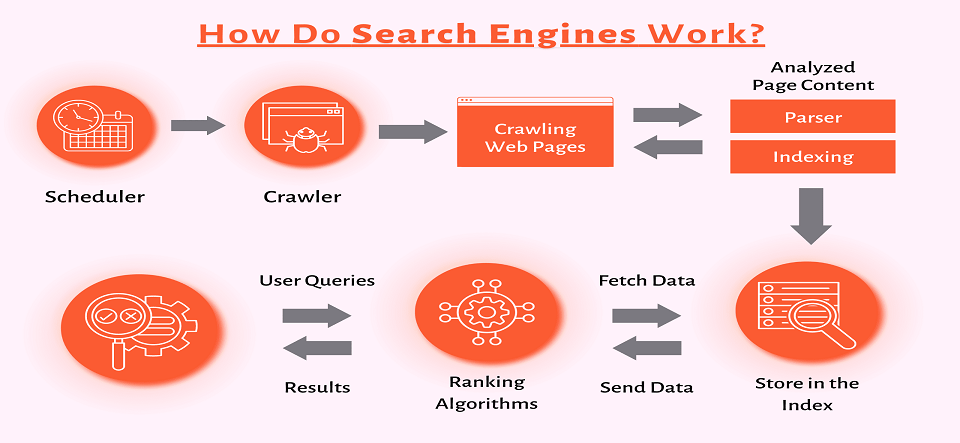How Google Search Engine Works Step by Step | Search Engine Principles
How Search Engine Works:- Search engines have become an integral part of our daily lives. Whenever we want to know about something or buy something, we turn to search engines. It has become a habit for us to search for everything on search engines, but have you ever wondered How Search Engines Works?
Search engines have complex algorithms that determine the results we see when we search for something. These algorithms are designed to ensure that the most relevant results are displayed at the top of the search engine results page (SERP). In this article, we will discuss how search engines work and what factors they consider while ranking a website.
How do Search Engines Work?
Search engines work in three basic steps:
Filed under Google SEO tips, SEO Tips, Search Engines
Spider – a browser-like program that downloads web pages.
Crawler – a program that automatically follows all of the links on each web page.
Indexer – a program that analyzes web pages downloaded by the spider and the crawler.
Database– storage for downloaded and processed pages.
Results Engine – extracts search results from the database.
Web server – a server that is responsible for interaction between the user and other search engine components.
Specific implementations of search mechanisms may differ. For example, the Spider+Crawler+Indexer component group might be implemented as a single program that downloads web pages, analyzes them, and then uses their links to find new resources. However, the components listed are inherent to all search engines and the SEO principles are the same.
Spider:- This program downloads web pages just like a web browser. The difference is that a browser displays the information presented on each page (text, graphics, etc.) while a spider does not have any visual components and works directly with the underlying HTML code of the page. You may already know that there is an option in standard web browsers to view source HTML code.
Crawler:- This program finds all links on each page. Its task is to determine where the spider should go either by evaluating the links or according to a predefined list of addresses. The crawler follows these links and tries to find documents not already known to the search engine.
Indexer:- This component parses each page and analyzes the various elements, such as text, headers, structural or stylistic features, special HTML tags, etc.
Database:- This is the storage area for the data that the search engine downloads and analyzes. Sometimes it is called the index of the search engine.
Results Engine:- The results engine ranks pages. It determines which pages best match a user’s query and in what order the pages should be listed. This is done according to the ranking algorithms of the search engine. It follows that page rank is a valuable and interesting property and any SEO specialist is most interested in it when trying to improve his site search results. In this article, we will discuss the SEO factors that influence page rank in some detail.
Web server:- The search engine web server usually contains an HTML page with an input field where the user can specify the search query.
What Factors Affect Search Engine Rankings?
Search engines use hundreds of factors to determine the ranking of a web page, but the most important factors are:
- Content
The content on a web page is the most important factor for search engine rankings. The content should be unique, informative, and relevant to the user’s search query. The search engine also looks at the length of the content, the use of keywords, and the readability of the content.
- Backlinks
Backlinks are links from other websites that point to your website. The quality and quantity of backlinks are important for search engine rankings. The search engine considers backlinks as a vote of confidence for your website.
- User Experience
The user experience on a website is an important factor for search engine rankings. The website should be easy to navigate, fast-loading, and mobile-friendly. The search engine also considers the bounce rate and the time spent on the website.
- Page Speed
The page speed of a website is an important factor for search engine rankings. The search engine prefers websites that load quickly because it provides a better user experience.
- On-Page Optimization
On-page optimization includes optimizing the title tag, meta description, and header tags. The search engine uses these elements to understand the content of the web page.


